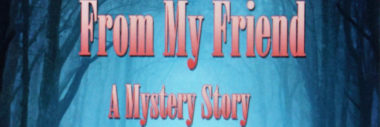Stories Short and Strange
17 short stories for general audiences ranging from the unusual to the unbelievable to the just plain strange.


17 short stories for general audiences ranging from the unusual to the unbelievable to the just plain strange.

Jim Jenkins is an ace detective who solves the most difficult crimes. Yet he always works alone. Or does he?

“He followed me home, Mom, can I keep him?” Why do we each seem to know what the other is thinking? ... Anyone wishing for an adult PAW Patrol will love this!
I had a busy day teaching Language Arts yesterday, which triggered my favorite teaching memory. Several years ago, I was helping out in a middle school science class. The students were doing an experiment in teams, writing their findings in notebooks. Toward the end of the period, there was a mad dash to finish and
Yesterday I discussed how redundancies in common expressions, like pots & pans and law & order, imply that English has too many words. Yet the opposite case can also be made. In the words of Bill Bryson in his book The Mother Tongue: English & How It Got That Way — “And yet there are odd gaps.
How many words are there in the English language? I’ve seen estimates ranging from as many as 400,000 to a million if all the scientific and technical words are counted. Are we getting to the point where we have too many words? (Also see my post on “The English language is about one half redundant.”) Previously
“Time flies like an arrow. Fruit flies like a banana.” I thought those of you who like wordplay would enjoy this. It comes from a column entitled “Verbal Energy” by Ruth Walker which runs in the Christian Science Monitor. This column is “How to Avoid Being Led Down a Garden Path” (December 22, 2014). It’s
Recently I came across an interview with Taylor Branch, Martin Luther King, Jr.’s, biographer. Published in the January 2015 issue of “Smithsonian” magazine, it discusses Dr. King’s true legacy. Branch makes an important case: “Look at the fall of the Berlin Wall, the fall of the whole Soviet Union, begun with nonviolent demonstrations in a
It is a fundamental principle of warfare: control the high ground and you have the advantage. Of course, the ultimate high ground is in the air. In the American Civil War, that meant balloons. Both the Union and Confederacy experimented with balloons, with the Union having more success, although “success” is a relative term in
I was standing out in front of my house the other night, enjoying the evening air. There was a nice sunset, and the birds were out happily chirping. But something more sinister was out, too. As I looked up the street, I saw the largest dog I have ever seen. He was about the size
In a previous post I mentioned aibohphobia as the fear of palindromes (and which itself is a palindrome). Which leads to the question — how many things are there to be afraid of? Lots. My Webster’s New World College Dictionary lists phobia as “an irrational, excessive, and persistent fear of some particular thing or situation”,
A judge told this anecdote during a speech I heard a long time ago. He was about to sentence a young man, and asked him if he had anything to say. The young man replied, “Yes sir, are you a Buckeye?” No, the judge wasn’t, but the question was so unusual it piqued his curiosity.
This is a true story from a friend in the advertising business. He had designed a calendar for a client as a beginning-of-the-year promotion. Each month was introduced with a wise saying. One month’s saying was “Early to bed and early to rise makes a man healthy, wealthy, and wise.” The following month’s was “Well